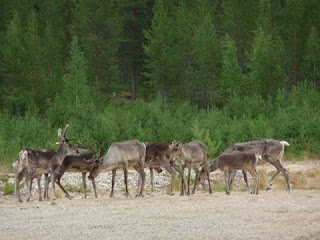Being the culturally sensitive traveller I am I thought I should give it a go, and I started learning a few basic words and trying to get both the pronunciation and rhythm right - needless to say I didn't do very well, particularly as most Finns are such competent speakers of English. However I did find that some Finns are a little shy about speaking English, perhaps as they don't get much practice, so I learnt the phrase for "Don't be shy". One day, Oscar a six or seven year old boy who lived next door came for one of his regular visits and seemed a little frightened of the strange speaking, bearded foreigner. Trying my best to put him at ease I said what I thought was "Don't be shy" which caused everyone in the room to dissolve in to fits of laughter and saw Oscar bolting out the door. When the laughter finally subsided I asked what I had said, and it turned out by not pronouncing one syllable correctly (of course it was a double letter) I had actually said "Don't take a shit !!!"
One can imagine Oscar running home to his parents saying the strange foreigner told me not to go to the toilet. After that I pretty much lost my desire to learn any more Finnish.
















